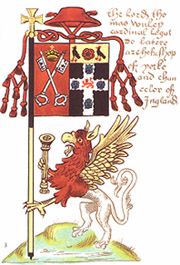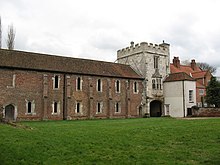Thomas Wolsey
Thomas Wolsey (* 1475 ? In Ipswich ; † November 28, 1530 in Leicester ) was an English statesman, Roman Catholic Archbishop of York and cardinal . He held the office of the English Lord Chancellor and rose to become the most powerful man in England for many years.
Life
Thomas was the son of Robert Wulcy from Ipswich (1438-1496) and Joan Daundy. According to several sources , his father was a butcher , but this information is not certain.
Wolsey studied theology at Magdalen College , Oxford . He was ordained a priest on May 10, 1498 by John Blythe , Bishop of Salisbury , at Peter and Pauls Church in Marlborough .
Rector of the Church at Limington, Somerset, since October 1500, he was also the local chaplain of the Archbishop of Canterbury. When the Archbishop died in 1503, Wolsey moved as chaplain to Sir Richard Nanfan, the governor of Calais. This sent him to King Henry VII. , Of him in 1506 as ambassador to the future Emperor Maximilian I to Bruges sent and Wolsey in 1507 appointed his own chaplain, possibly on the recommendation of Bishop Fox of Winchester happened. The king made him Dean of Lincoln on February 2, 1509 . Before June 1509 he became Dean of Hereford, and through Henry VIII also his almsman and in 1510 a member of his Privy Council .
He received his doctorate in theology in 1510 and was also canon of the Chapter of Windsor that year .
After receiving the diocese of Tournai in 1513 , he was appointed Bishop of Lincoln on February 6, 1514 . On March 26, 1514 he was ordained bishop in Lambeth Palace , and on September 15 of that year he was also made Archbishop of York .
Pope Leo X elevated Wolsey to cardinal on September 10, 1515 and awarded him the titular church of Santa Cecilia in Trastevere . Already on December 24th 1515 he was appointed Lord Chancellor of England. When the Archbishop of Canterbury , injured by the upstart's pride, resigned from his position as Chancellor, it was transferred to Wolsey. Since this uprising caused the resignation of the rest of the Crown Councils, the entire power of government came into his hands. The decisive position that King Henry VIII occupied in the battles between Emperor Charles V and Francis I of France was used by Wolsey for his own advantage, as well as for the king's gain in power.
Wolsey acted on the principle of The Prince of Niccolò Machiavelli in accordance with a daily political power optimization. In 1516 he gave the diocese of Tournai to Francis I in return for an annual pension of 12,000 livres . On behalf of Leo X. Wolsey initiated in 1518 the Treaty of London . For this purpose, the Pope appointed him papal legate with very extensive powers (Latin: legatus a latere) and an annual salary of 7,500 ducats . On July 30, 1518, he had also become administrator of the Diocese of Bath and Wells , which he remained until 1523.
In May 1520 Wolsey initiated a meeting of Henry VIII with Charles V. In June 1520 he organized with great pomp a meeting of Francis I of France with Henry VIII at the Camp du Drap d'Or near Balinghem .
With Wolsey's power, his pride and arrogance increased, and he was able to demonstrate a powerful demeanor in accordance with the ruling ideal of the Renaissance prince after Niccolò Machiavelli. With his apostolic nunciature he set up his own court of justice, suppressed the clergy , arbitrarily united the rich dioceses of Durham (March 26, 1523) and Winchester (February 8, 1529) with the Archdiocese of York , withdrew the Abbey of St Albans (1521) and tore it down many other benefices in themselves. His income nearly reached that of the crown and his expenses exceeded that of most kings.
After Wolsey had hesitated for a long time between Francis I and Charles V and had been showered with favors from both sides, he finally decided in 1521 in favor of the emperor, who granted him a rich annual allowance and the prospect of becoming papal. He made an alliance with Charles on August 25th and November 24th and declared war on France. However, since Charles neither supported Henry VIII's French policy of conquest, nor had he asserted his influence in the conclave for Wolsey when the Holy See was vacant twice , the latter made peace with France in 1525 and even declared war on the emperor in 1528, which, however, by peace in 1529 was terminated by Cambrai .
His hostility to Charles V also divided him with his aunt, Henry VIII's wife Catherine of Aragón ; and in order to marry his king to a French princess, he tried to separate his Spanish marriage. Heinrich also wanted a divorce, but to marry his lover Anne Boleyn . When the Pope opposed difficulties for the divorce, the King and Anne believed that the reason for this could be found in Wolsey's intrigues. This was overthrown in October 1529, had to leave his magnificent Palace in London ( Palace of Whitehall ) and retire to his country house in Esher , Surrey . Although the king left him in the possession of the dioceses of York and Winchester, Parliament accused him of abusing his ecclesiastical power and sentenced him to the loss of his property and to indefinite prison.
Henry VIII pardoned him, but referred him to the Archdiocese of York, where he set up his residence in Cawood Castle . In November 1530 he was again accused of high treason should he be brought to London, but died en route on November 28 in Leicester Abbey. Here he also found his grave.
In Shakespeare's drama Henry VIII , which depicts the fall of Wolseys, the cardinal puts in the mouth (3rd act, 2nd scene):
|
|
Wolsey loved the sciences and founded several colleges and teaching institutions from his own resources. In the course of his life he had several girlfriends. Known are Joan Clansey, Joan Larke, who bore him a daughter, and Dorothe Wynter, who bore him a son.
The image of Thomas Wolsey as a greedy and power-addicted person is primarily shaped by the characterization his contemporary Polydor Virgil gives in his Anglica Historia , a humanistic account of English history.
literature
- Wolsey, Thomas . In: Meyers Konversations-Lexikon . 4th edition. Volume 16, Verlag des Bibliographisches Institut, Leipzig / Vienna 1885–1892, pp. 741–742.
- George Cavendish: The Life and Death of Cardinal Wolsey. OUP, London 1961.
- Charles W. Ferguson: Naked to Mine Enemies. The life of Cardinal Wolsey. Little Brown, Boston, Mass. 1958.
- Peter Gwyn: The King's Cardinal. The rise and fall of Thomas Wolsey. Barrie & Jenkins, London 1990, ISBN 0-7126-2190-3 .
- Derek Wilson: In the Lion's Court. Power, ambition, and sudden death in the reign of Henry VIII. Hutchinson, London 2001, ISBN 0-09-180118-4 .
- Ronny Baier: Wolsey, Thomas, Cardinal Archbishop of York. In: Biographisch-Bibliographisches Kirchenlexikon (BBKL). Volume 22, Bautz, Nordhausen 2003, ISBN 3-88309-133-2 , Sp. 1564-1573.
Web links
- Wolsey, Thomas. In: Salvador Miranda : The Cardinals of the Holy Roman Church. ( Florida International University website), accessed November 12, 2016.
| predecessor | Office | successor |
|---|---|---|
| Christopher Bainbridge |
Archbishop of York 1514–1530 |
Edward Lee |
| Charles de Hautbois |
Bishop of Tournai 1514–1518 |
Louis Guillard |
| William Smyth |
Bishop of Lincoln 1514–1515 |
William Atwater |
| Thomas Ruthall |
Bishop of Durham 1523–1529 |
Cuthbert Tunstall |
| Richard Fox |
Bishop of Winchester 1529–1530 |
Stephan Gardiner |
| William Warham |
Lord Chancellor of England 1515–1529 |
Thomas More |
| Adriano di Castello |
Bishop of Wells 1518–1523 |
John Clerk |
| personal data | |
|---|---|
| SURNAME | Wolsey, Thomas |
| BRIEF DESCRIPTION | English statesman and Roman Catholic cardinal |
| DATE OF BIRTH | around 1475 |
| PLACE OF BIRTH | Ipswich |
| DATE OF DEATH | November 28, 1530 |
| Place of death | Leicester |



